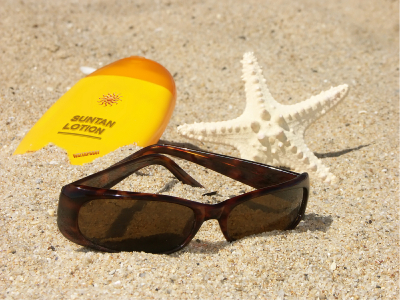Causes of Photosensitivity
Photosensitivity may be defined as sensitivity of the skin to a light source. And people with particular skin types tend to be more sensitive to this occurring. Photosensitivity can occur due to a number of reasons:
- Medications. Certain ones may make the skin more sensitive to sunlight. These include most of the tetracycline antibiotics, birth control pills, antihistamines, antidepressants and many retinoids (such as Vitamin A derivatives) – see a more exhaustive list below.
- Medical Conditions. Some medicals conditions lead to increased light sensitivity. Individuals with systemic lupus erythematosus experience skin symptoms after sunlight exposure and some types of porphyria are aggravated by sunlight.
- Skin Cancer. The development of skin cancer is linked to excessive sunlight exposure, and the rare hereditary condition xeroderma pigmentosum (a defect in DNA repair) can accelerate this risk.
Photosensitivity may be referred to as “photoallergy” or “sunlight allergy”, even though an actual allergy is not associated with the condition.
Four-hundred drugs are known to cause lightsensitive and photo-allergic reactions. If you’re not sure whether any of your medications are likely to cause photosensitivity, you can check with your doctor or pharmacist.
Minimizing Photosensitivity
The use of a well formulated broad spectrum sunscreen that blocks both UVA and UVB rays is important in managing photosensitivity. Whether you opt for a chemical blocking formulation as with Anthelios sunscreens or a physical blocking one that contains zinc oxide, like Apothekari Shade SPF 30, daily sunscreen use is a must if you are taking any photosensitizing medications.
Common Photosensitizing Medications
Here is a list of the more common photosensitizing medications, listed by generic name.
| ACAMPROSATE | ACETAMINOPHEN |
| ACETAZOLAMIDE | ACETOHEXAMIDE |
| ACYCLOVIR | ALDESLEUKIN |
| ALITRETINOIN | ALLOPURINOL |
| ALMOTRIPTAN | ALPRAZOLAM |
| AMANTADINE | AMILORIDE |
| AMINOLEVULINIC ACID | AMINOSALICYLATE SODIUM |
| AMIODARONE | AMITRIPTYLINE |
| AMOBARBITAL | AMOXAPINE |
| ANAGRELIDE | ANTHRAX VACCINE |
| ARSENIC | ATAZANAVIR |
| ATENOLOL | ATORVASTATIN |
| ATROPINE SULFATE | AZATADINE |
| AZATHIOPRINE | AZITHROMYCIN |
| BENAZEPRIL | BENDROFLUMETHIAZIDE |
| BENZTHIAZIDE | BENZTROPINE |
| BERGAMOT | BETAXOLOL |
| BEXAROTENE | BIMATOPROST |
| BISOPROLOL | BROMPHENIRAMINE |
| BUMETANIDE | BUPROPION |
| BUTABARBITAL | BUTALBITAL |
| CAPECITABINE | CAPTOPRIL |
| CARBAMAZEPINE | CARISOPRODOL |
| CARTEOLOL | CARVEDILOL |
| CEFAZOLIN | CEFTAZIDIME |
| CELECOXIB | CETIRIZINE |
| CEVIMELINE | CHLORAMBUCIL |
| CHLORDIAZEPOXIDE | CHLORHEXIDINE |
| CHLOROQUINE | CHLOROTHIAZIDE |
| CHLOROTRIANISENE | CHLORPHENIRAMINE |
| CHLORPROMAZINE | CHLORPROPAMIDE |
| CHLORTETRACYCLINE | CHLORTHALIDONE |
| CINOXACIN | CIPROFLOXACIN |
| CITALOPRAM | CLEMASTINE |
| CLOFAZIMINE | CLOFIBRATE |
| CLOMIPRAMINE | CLOPIDOGREL |
| CLORAZEPATE | CLOZAPINE |
| CO-TRIMOXAZOLE | COLCHICINE |
| CORTICOSTEROIDS | CROMOLYN |
| CYCLAMATE | CYCLOBENZAPRINE |
| CYCLOTHIAZIDE | CYPROHEPTADINE |
| DACARBAZINE | DANAZOL |
| DANTROLENE | DAPSONE |
| DEMECLOCYCLINE | DESIPRAMINE |
| DEXCHLORPHENIRAMINE | DIAZOXIDE |
| DICLOFENAC | DIFLUNISAL |
| DILTIAZEM | DIMENHYDRINATE |
| DIPHENHYDRAMINE | DISOPYRAMIDE |
| DOCETAXEL | DONG QUAI |
| DOXEPIN | DOXYCYCLINE |
| DULOXETINE | EFAVIRENZ |
| ENALAPRIL | ENOXACIN |
| EPIRUBICIN | EPOETIN ALFA |
| ESOMEPRAZOLE | ESTAZOLAM |
| ESTROGENS | ETHACRYNIC ACID |
| ETHAMBUTOL | ETHIONAMIDE |
| ETODOLAC | FELBAMATE |
| FENOFIBRATE | FLOXURIDINE |
| FLUCYTOSINE | FLUOROURACIL |
| FLUOXETINE | FLUPHENAZINE |
| FLURBIPROFEN | FLUTAMIDE |
| FLUVASTATIN | FLUVOXAMINE |
| FOSINOPRIL | FURAZOLIDONE |
| FUROSEMIDE | GANCICLOVIR |
| GATIFLOXACIN | GEMIFLOXACIN |
| GENTAMICIN | GLATIRAMER |
| GLIMEPIRIDE | GLIPIZIDE |
| GLYBURIDE | GLYCOPYRROLATE |
| GOLD And GOLD COMPOUNDS | GOLDENSEAL |
| GREPAFLOXACIN | GRISEOFULVIN |
| HALOPERIDOL | HENNA |
| HEROIN | HYDRALAZINE |
| HYDROCHLOROTHIAZIDE | HYDROFLUMETHIAZIDE |
| HYDROXYCHLOROQUINE | HYDROXYUREA |
| HYDROXYZINE | HYOSCYAMINE |
| IBUPROFEN | IMATINIB |
| IMIPRAMINE | INDAPAMIDE |
| INDOMETHACIN | INFLIXIMAB |
| INTERFERON BETA 1-A | INTERFERON BETA-1B |
| INTERFERONS, ALFA-2 | IRINOTECAN |
| ISOCARBOXAZID | ISONIAZID |
| ISOTRETINOIN | ITRACONAZOLE |
| KANAMYCIN | KAVA |
| KETOCONAZOLE | KETOPROFEN |
| KETOTIFEN | LAMOTRIGINE |
| LEUPROLIDE | LEVOFLOXACIN |
| LINCOMYCIN | LISINOPRIL |
| LOMEFLOXACIN | LORATADINE |
| LOSARTAN | LOXAPINE |
| MAPROTILINE | MECLIZINE |
| MECLOFENAMATE | MEDROXYPROGESTERONE |
| MEFENAMIC ACID | MELATONIN |
| MELOXICAM | MEPROBAMATE |
| MERCAPTOPURINE | MESALAMINE |
| MESORIDAZINE | METFORMIN |
| METHAZOLAMIDE | METHENAMINE |
| METHOTREXATE | METHOXSALEN |
| METHYCLOTHIAZIDE | METHYLDOPA |
| METHYLPHENIDATE | METOLAZONE |
| MINOCYCLINE | MIRTAZAPINE |
| MITOMYCIN | MOEXIPRIL |
| MOLINDONE | MOXIFLOXACIN |
| NABUMETONE | NALIDIXIC ACID |
| NAPROXEN | NAPROXEN |
| NARATRIPTAN | NEFAZODONE |
| NIFEDIPINE | NISOLDIPINE |
| NITROFURANTOIN | NORFLOXACIN |
| NORTRIPTYLINE | OFLOXACIN |
| OLANZAPINE | ORAL CONTRACEPTIVES |
| OXAPROZIN | OXCARBAZEPINE |
| OXYTETRACYCLINE | PACLITAXEL |
| PANTOPRAZOLE | PAROXETINE |
| PENTOBARBITAL | PENTOSAN |
| PENTOSTATIN | PERPHENAZINE |
| PHENELZINE | PHENINDAMINE |
| PHENOBARBITAL | PILOCARPINE |
| PIMOZIDE | PIROXICAM |
| POLYTHIAZIDE | PRAVASTATIN |
| PROCARBAZINE | PROCHLORPERAZINE |
| PROCYCLIDINE | PROMAZINE |
| PROMETHAZINE | PROPRANOLOL |
| PROPYLTHIOURACIL | PROTRIPTYLINE |
| PSORALENS | PYRAZINAMIDE |
| PYRIDOXINE | PYRILAMINE |
| PYRIMETHAMINE | QUETIAPINE |
| QUINACRINE | QUINAPRIL |
| QUINESTROL | QUINETHAZONE |
| QUINIDINE | QUININE |
| RABEPRAZOLE | RAMIPRIL |
| RANITIDINE | RIBAVIRIN |
| RILUZOLE | RISPERIDONE |
| RITONAVIR | ROFECOXIB |
| ROPINIROLE | RUE |
| SACCHARIN | SAQUINAVIR |
| SCOPOLAMINE | SELEGILINE |
| SELENIUM | SERTRALINE |
| SILDENAFIL | SIMVASTATIN |
| SMALLPOX VACCINE | SOTALOL |
| SPARFLOXACIN | SPIRONOLACTONE |
| ST JOHN’S WORT | STREPTOMYCIN |
| SULFACETAMIDE | SULFADIAZINE |
| SULFADOXINE | SULFAMETHOXAZOLE |
| SULFASALAZINE | SULFISOXAZOLE |
| SULINDAC | SUMATRIPTAN |
| TACROLIMUS | TARTRAZINE |
| TERBINAFINE | TETRACYCLINE |
| THIMEROSAL | THIOGUANINE |
| THIORIDAZINE | THIOTHIXENE |
| TIAGABINE | TIMOLOL |
| TIOPRONIN | TOLAZAMIDE |
| TOLBUTAMIDE | TOLMETIN |
| TOPIRAMATE | TORSEMIDE |
| TRANYLCYPROMINE | TRAZODONE |
| TRETINOIN | TRIAMTERENE |
| TRIAZOLAM | TRICHLORMETHIAZIDE |
| TRIFLUOPERAZINE | TRIHEXYPHENIDYL |
| TRIMEPRAZINE | TRIMETHADIONE |
| TRIMETHOPRIM | TRIMETREXATE |
| TRIMIPRAMINE | TRIOXSALEN |
| TRIPELENNAMINE | TRIPROLIDINE |
| TROVAFLOXACIN | VALDECOXIB |
| VALPROIC ACID | VALSARTAN |
| VANCOMYCIN | VARDENAFIL |
| VENLAFAXINE | VERAPAMIL |
| VERTEPORFIN | VINBLASTINE |
| VITAMIN A | VORICONAZOLE |
| YARROW | ZALCITABINE |
| ZALEPLON | ZIPRASIDONE |
| ZOLMITRIPTAN | ZOLPIDEM |





Does Plavix make you sunlight sensitive
Plavix’s monograph does not list photosensitivity as a side effect, however how any individual will react to a given medication will differ. If you feel that you are more sensitive to sunlight since starting on Plavix, then it is possible that the drug may be responsible.
I would check with your physician.
I did not see lovastatin or metopopol on the list of drugs causing photosensitivity. What is your opinion? What is the best treatment?
For Ginger, any ingredient could potentially cause problems for someone with skin sensitivities. The list given in the article you refer to is not intended to be exhaustive, and as with any skin care product, we highly recommend doing a test patch first to see if it is right for you. Dermatologists often recommend physical sunscreens to people who experience photosensitivities. Keys Solar Rx is one such physical sunscreen. Another line often recommended is Anthelios, usually for those with PMLE and similar afflictions.
Hi, How long does Acetazolamide stay in your system?
When will it be safe to go to a sun bed and in the sun?
Your response will be greatly appreciated. Thank you
Marie
For Marie:
As Acetazolamide is prescribed for different reasons, from glaucoma to altitude sickness, it is best to consult your physician about the affects of this drug and your system. Regardless of acetazolamide use, sunscreen is a must when going out in the sun to protect from damaging UVA and UVB rays. Latest research shows that tanning beds also carry the same risk as unprotected exposure to the sun. You may want to consider a self-tanning lotion as an alternative if you are looking for that summertime glow.
Best, Sharmani
Butalbital/Caffeine Aspirin is a pain reliever, as well as an anti-inflammatory and a fever reducer. Butalbital is a barbiturate. It relaxes muscle contractions involved in a tension headache. Caffeine is a central nervous system stimulant. It relaxes muscle contractions in blood vessels to improve blood flow. The combination of aspirin, butalbital, and caffeine is used to treat tension headaches. This medicine is not for treating headaches that come and go.
I am taking Verapamil HCl 120mg for migranes. I am wondering if taking this medication is why I am burning so easy when out in the sun even with sunscreen on… I was recently outside and recieved 2nd degree burns with thickness burns in some areas. Could this be a cause? The only other medications that I take are Zyrtec and vitamin D(I have a deficency)
For Laurie:
Thank you for your questions. Many oral medications can increase sun sensitivity, including Zyrtec. Even with sunscreen, you may be more at risk for sunburn. Consulting your doctor would be the best course of action as well as avoiding sun exposure as much as possible, including seeking shade, wearing protective clothing and reapplying broad spectrum sunscreen at least every two hours.
Best, Sharmani
Hello I’m currently taking a cocktailof medication and have experience itchy dry skin when exposure to sunlight on my four arms, below the knee to ankle and back of neck.
I take Lisinopril, Chorthalidone and Sertraline.